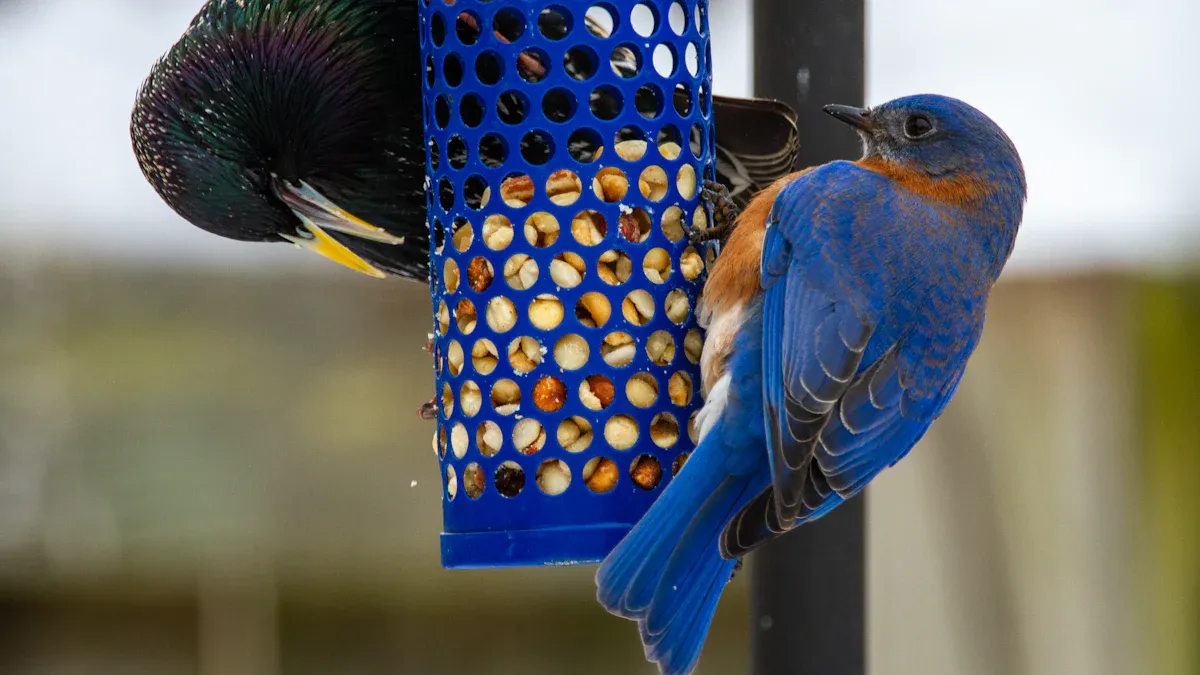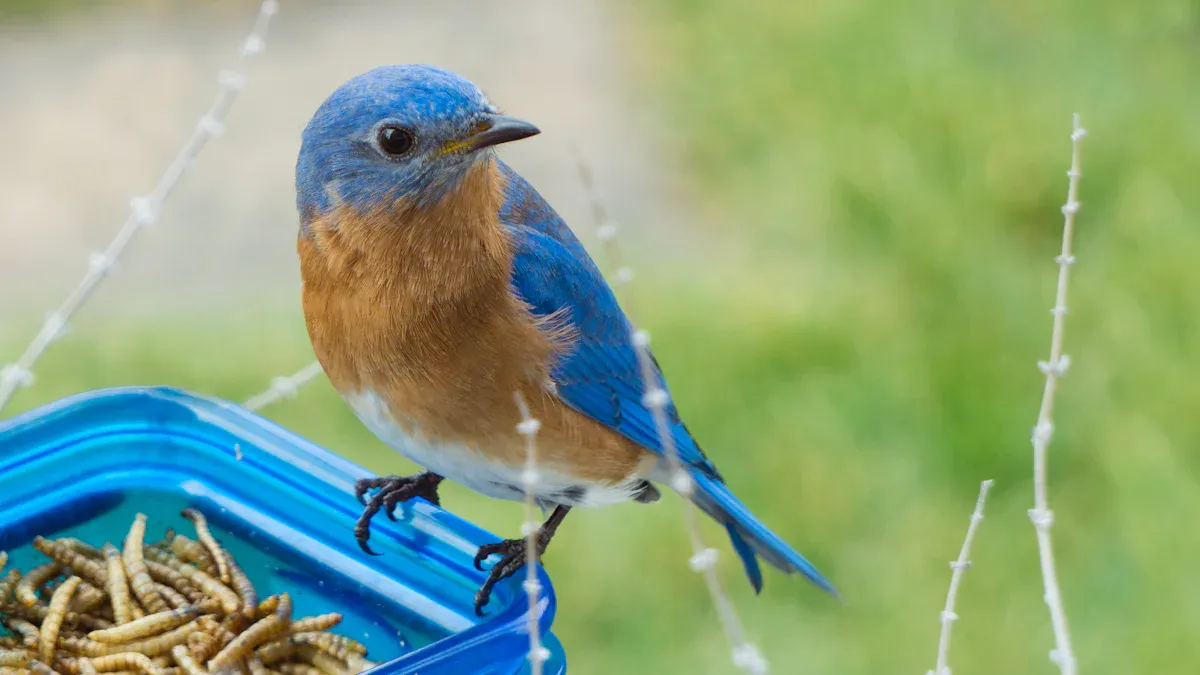
Have you ever wondered how bluebirds thrive in your backyard? Mealworm manufacturers make it possible by providing a steady supply of nutritious dried mealworms. Without them, finding quality food for your feathered friends would be a challenge. Pairing their mealworms with a mealworm feeder for bluebirds ensures easy and effective feeding.
Key Takeaways
- Mealworms are great food for bluebirds. They give protein and fats that keep birds healthy, especially in breeding and cold times.
- A mealworm feeder helps feed bluebirds easily. It gives them steady food and keeps the area clean.
- Buying from mealworm makers ensures good mealworms. This helps protect bluebirds and grow their numbers.
The Importance of Mealworms for Bluebirds
Nutritional Benefits of Mealworms
Mealworms are like a superfood for bluebirds. They’re packed with essential nutrients that help these birds stay healthy and active. Mealworms provide a rich source of protein, which is crucial for muscle development and energy. They also contain fats that give bluebirds the extra boost they need during colder months or when raising their young.
Did you know that bluebirds are insectivores? This means they primarily eat insects, and mealworms are one of their favorites. When natural food sources are scarce, like in winter, mealworms become even more important. They’re not just a treat; they’re a lifeline for these beautiful birds.
Why Mealworms Are Essential in Bluebird Diets
Bluebirds rely on insects like mealworms to meet their dietary needs. During spring and summer, they feast on larvae and other arthropods, which make up a significant part of their diet. Mealworms are especially helpful during the breeding season. They provide the nutrients needed for egg production and feeding hungry chicks.
When you use a mealworm feeder for bluebirds, you’re giving them a reliable food source. This is especially important in areas where natural insect populations are declining. By offering mealworms, you’re helping bluebirds thrive, even when their natural diet is harder to find.
Seasonal Feeding Needs of Bluebirds
Bluebirds change their diet with the seasons. In spring and summer, they eat plenty of insects and larvae because these are abundant. As fall and winter arrive, they switch to berries and fruits since insects become scarce. This seasonal shift means that supplemental feeding with mealworms is most critical during colder months and early spring.
By providing mealworms year-round, you can support bluebirds through these seasonal changes. Even when insects are plentiful, mealworms can still attract bluebirds to your yard. It’s a win-win for you and the birds!
Challenges of Sourcing Mealworms Without Manufacturers
Limited Availability for Individuals
Finding mealworms on your own can feel like searching for a needle in a haystack. Without manufacturers, the production and processing infrastructure for mealworms are limited. This makes it hard for individuals to source them consistently. The growing demand for mealworms as a sustainable protein source only adds to the challenge. You might think you can raise mealworms yourself, but that requires time, space, and expertise. For most people, it’s simply not practical.
Quality Issues with Unregulated Sources
When you buy mealworms from unregulated sources, you’re taking a gamble. The quality can vary wildly, and there’s no guarantee they’re safe for bluebirds. Did you know that only 28% of insect feed companies in the EU handle the entire process from rearing to processing? Many rely on sourcing whole dried insects, which increases the risk of contamination.
Manufacturers, on the other hand, follow strict safety standards. They regulate the diet of mealworms to prevent contamination and conduct regular quality checks. This ensures the mealworms you buy are safe and nutritious for your bluebirds.
High Costs and Time Investment
Raising mealworms at home might sound like a fun project, but it’s a lot of work. You’ll need to invest in proper equipment, monitor their diet, and maintain the right conditions for them to thrive. Even then, the yield might not meet your needs. Buying mealworms from unreliable sources can also be expensive, especially if you’re paying for poor-quality products. Manufacturers save you time and money by providing a ready supply of high-quality mealworms.
How Manufacturers Ensure Quality and Accessibility
Cultivation and Processing Standards
Mealworm manufacturers follow strict standards to ensure the mealworms you buy are safe and nutritious. They use guidelines like the European Food and Feed Law and HACCP principles to minimize risks from contaminants. These rules make sure the mealworms are raised in clean environments and processed with care.
Manufacturers also implement traceability systems. These systems track every step of the production process, so you can trust the mealworms meet safety regulations. Certifications like ISO 9001 and FSSC 22000 guarantee that the facilities maintain high-quality and safety standards.
Here’s a quick look at some of the key standards:
| Standard/Guideline | Description |
|---|---|
| European Food and Feed Law | Ensures safety of food and feed chains, requiring compliance from operators. |
| HACCP Principles | Reduces risks from contaminants in mealworm products. |
| ISO 9001 and FSSC 22000 | Guarantees quality and safety in production facilities. |
| Good Hygiene Practices | Ensures cleanliness and safety in mealworm production. |
| Traceability Systems | Tracks production to ensure compliance with safety regulations. |
Packaging for Convenience and Longevity
Manufacturers know you want mealworms that are easy to store and use. That’s why they focus on packaging that keeps mealworms fresh for longer. Airtight bags and resealable containers prevent moisture and pests from ruining the product. This means you can stock up without worrying about spoilage.
Convenient packaging also makes it easier to use a mealworm feeder for bluebirds. You can quickly pour out the right amount without any mess. It’s a simple way to keep your bluebirds happy and healthy.
Distribution Networks for Easy Access
Getting mealworms shouldn’t be a hassle. Manufacturers have built strong distribution networks to make sure you can find mealworms at local stores or online. These networks ensure a steady supply, so you don’t run out when your bluebirds need them most.
By working with retailers and online platforms, manufacturers make mealworms accessible to everyone. Whether you’re a seasoned bird enthusiast or just starting out, you’ll always have access to high-quality mealworms.
The Role of a Mealworm Feeder for Bluebirds

Benefits of Using a Mealworm Feeder
Using a mealworm feeder for bluebirds makes feeding simple and effective. These feeders are designed to hold mealworms securely, preventing them from scattering or escaping. This means less mess for you and more food for the birds. Bluebirds love mealworms, and offering them consistently is one of the best ways to attract these colorful visitors to your yard.
Live mealworms are especially appealing to bluebirds. They’re packed with nutrients and are a favorite during cold weather or breeding seasons. Starting with live mealworms can even help train bluebirds to accept dried ones later. A feeder ensures you can provide these treats in a controlled and convenient way, making it easier to support your feathered friends year-round.
Placement Tips for Effective Feeding
Where you place your feeder matters. Bluebirds prefer open spaces where they can spot predators easily. Position your feeder in a sunny area, away from dense shrubs or trees. This setup makes bluebirds feel safe while feeding.
Specific feeders, like the Woodlink Domed Bluebird Feeder or the Stokes Snacks and Treats Feeder, are excellent choices. These feeders are designed to keep mealworms contained, whether live or dried. Consistency is key—refill your feeder regularly to encourage repeat visits. Bluebirds will quickly learn to rely on your yard as a dependable food source.
Encouraging Bluebirds to Visit Feeders
Attracting bluebirds to your feeder takes a little patience. Start by offering live mealworms on a platform feeder. Bluebirds are naturally curious and will be drawn to the movement of live mealworms. Once they’re familiar with your feeder, you can gradually introduce dried mealworms.
Keep your feeder clean and stocked to maintain their interest. Bluebirds are creatures of habit, and a reliable food source will keep them coming back. Over time, you’ll enjoy the sight of these beautiful birds visiting your yard regularly.
Supporting Bluebird Conservation Through Reliable Supply
Mealworms and Bluebird Population Recovery
Mealworms play a vital role in helping bluebirds thrive, especially during challenging times. They’re not just a snack; they’re a lifeline. When natural food sources disappear due to bad weather, mealworms step in to fill the gap. They provide essential nutrition for nestlings and help incubating females find food quickly, so they don’t have to leave their eggs unattended for long.
Did you know mealworms can even encourage bluebirds to use nest boxes? By offering this reliable food source, you’re creating a safe and supportive environment for them to raise their young. Mealworms also help bluebirds survive harsh winters and severe weather spells when finding food becomes nearly impossible.
- Mealworms reduce the time females spend away from their eggs.
- They provide supplemental food for nestlings during food shortages.
- They help bluebirds survive extreme weather conditions.
By feeding mealworms, you’re directly contributing to the recovery of bluebird populations.
Empowering Bird Enthusiasts to Contribute
You might think your small efforts don’t matter, but they do! By offering mealworms, you’re playing a key role in bluebird conservation. Mealworms make it easier for you to attract bluebirds to your yard and support them through tough seasons.
The Michigan Bluebird Society recommends mealworms as the best food for bluebirds. They’re easy to offer and can entice bluebirds to nest in your area. This means you’re not just feeding birds; you’re helping them raise their families. Even if one parent is missing, mealworms can provide the extra nutrition needed to keep the young healthy.
Tip: Consistently offering mealworms can turn your yard into a haven for bluebirds.
Manufacturers’ Role in Large-Scale Conservation
Mealworm manufacturers are the backbone of bluebird conservation efforts. They ensure a steady supply of high-quality mealworms, making it easier for bird enthusiasts like you to support these birds. Without manufacturers, sourcing mealworms would be time-consuming and expensive.
Manufacturers also help conservation groups by providing mealworms for large-scale projects. These efforts include setting up feeding stations in areas where bluebirds struggle to find food. By working together, manufacturers and conservationists create a network of support that helps bluebird populations recover and thrive.
When you buy mealworms from trusted manufacturers, you’re not just feeding birds—you’re supporting a system that protects them on a larger scale. It’s a simple way to make a big difference.
Mealworm manufacturers make feeding bluebirds simple and effective. Their efforts ensure you always have access to high-quality mealworms, whether for a mealworm feeder for bluebirds or other feeding methods. By supporting these manufacturers, you’re helping bluebirds thrive and contributing to their conservation. Together, we can protect these beautiful birds for future generations.
FAQ
How often should I feed bluebirds mealworms?
You can offer mealworms daily, especially during breeding and colder months. Consistency helps bluebirds rely on your yard as a dependable food source.
Can I feed bluebirds only dried mealworms?
Yes, but starting with live mealworms works best. Bluebirds love the movement. Gradually switch to dried ones once they’re familiar with your feeder.
Tip: Always keep your feeder clean and stocked to maintain their interest.
Are mealworms safe for other backyard birds?
Absolutely! Many insect-eating birds, like robins and wrens, enjoy mealworms. Offering them can attract a variety of feathered visitors to your yard.


